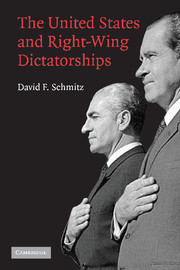6 - What Is the Alternative?
The Reagan Doctrine and Authoritarian Regimes
Published online by Cambridge University Press: 05 June 2012
Summary
During the 1980 presidential campaign, Ronald Reagan criticized Jimmy Carter's foreign policy for creating a lack of respect for the United States in the world that damaged vital national interests. He blamed Carter's emphasis on human rights for the loss of Nicaragua and Iran, renewed Soviet adventurism, and the decline of American power and prestige in the world. To remedy this situation, Reagan called for a return to the policies of the Cold War. He promised to restore American strength through an arms buildup and to reverse what he saw as American losses overseas by unconditionally upholding the policy of containment and assisting right-wing dictators who promised stability and support for American policies. Reagan argued throughout the campaign that the Soviet Union was responsible for all the unrest in the world, and that it was the obligation of the United States to back its friends and allies against Moscow's efforts to overthrow their governments. Given this, any authoritarian regime, no matter how odious, would receive American aid as long as it was anticommunist and friendly to the United States.
Reagan's classic bipolar, Cold War view drew upon the neoconservative critique of American foreign policy developed during the late 1970s. The neoconservatives saw détente as a one-way street, with the Soviet Union gaining all of the advantages, and believed that the policy of human rights was directed only against American allies, while leaving the worst enemies of freedom, totalitarian communist regimes, unaffected.
- Type
- Chapter
- Information
- The United States and Right-Wing Dictatorships, 1965-1989 , pp. 194 - 240Publisher: Cambridge University PressPrint publication year: 2006



